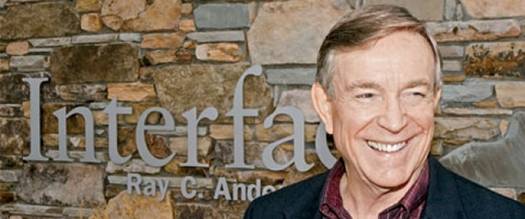
There is only so much water in the world; only so much topsoil; only one atmosphere; only so much CO2 that can be stuffed into that atmosphere. The pressure to be sustainable is altering the competitive landscape. Plenty of activity but lacking in business perspective, the challenge is that organizations want to be around in 20 years time. That makes sustainability significant.
As the winds of change blow, it will be easy to distinguish between those who are satisfied and those who are hungry. Change brings the secrets of the heart to light. Sustainability is emerging as a core business issue. In the corporate world, most business leaders agree that achieving real bottom line improvements is critical to business sustainability. Sustainability is all about inclusion. Bottom line achievements are the result of close collaboration with stakeholders.
Ray C. Anderson was chairman and chief executive of the world’s largest carpet-tile manufacturer recently passed away. A self-proclaimed “recovering plunderer”, he re-invented his worldwide factory operation to reduce its environmental impact. “Interface and the world have lost a great man today,” said Dan Hendrix, President and Chief Executive Officer of Interface, announcing that Anderson lost a 20-month battle with cancer on August 8th, 2011.
The state of sustainability in business today is complex and evolving, the challenge to align company practices with company principles comes down to the importance of organizations to “walk the talk.” Companies need to align sustainability strategy with business strategy. That means integrating sustainability into operations and processes across the value chain, the supply chain and the demand chain.
As a 60-year-old executive, he had given little thought to the environment but he was not satisfied. His “epiphany” came when he read Paul Hawken’s “Ecology of Commerce”. In his speeches, Anderson described reading it as a spear in the chest experience. “A new definition of success burst into my consciousness, and the latent sense of legacy asserted itself. I got it,” he said in a 2005 speech. I was a plunderer of Earth, and that is not the legacy one wants to leave behind. I wept.”
After that he seemed to think about nothing else – telling fellow executives about the need to reduce waste and carbon emissions. Many had not embraced the idea that a total shift was needed. The sense of urgency was pushed back to another day. They just were not stepping up to the plate. They did not see themselves as the central elemental force – for better or for worse – with regards to the environment and a sustainable future.
What started out as the right thing to do quickly became the smart thing, Cost savings from eliminating waste alone were in the hundreds of millions of dollars. He was the first to prove that a corporate-wide, systemic commitment to sustainability could increase profitability. Those efforts drew praise from environmental organizations and earned him an appointment to a White House environmental commission under President Bill Clinton.
In 2000 he relinquished the day-to-day running of the company to Dan Hendrix so he could become the synergistic advocate around the country and the world for what he called a “zero footprint.” That is, going beyond the sustainable to restorative to put back more than we take and do good to the earth, not just no harm, through the power of example. Seventeen years later, Interface was more than half-way towards the vision of “Mission Zero”.
Efforts he began have so far reduced the so-called carbon footprint of the company’s 26 factories by about half. Anderson’s legacy lights the way for the future of the world’s productive and living environment. Besides transforming his own business, he went on to influence corporate giants like Wal-Mart.
Ray Anderson was authentic. His greatness came from the expansion of his vision from year to year. In his last book he wrote: “We are all part of the continuum of humanity and the web of life in general. We will have lived our brief span and either helped or hurt that continuum, that web, and the Earth that sustains all life. Which will it be? It’s your call.”
Dennis Walsh is a sustainability researcher, writer and consultant. Read his sustainability blog – http://blogs.cityu.edu/international/

